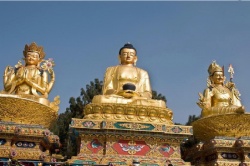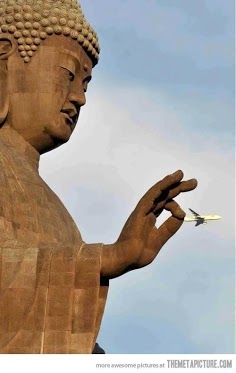Ananda was the Buddha’s cousin.
Ananda was the Buddha’s cousin. His name means “rejoicing,”46 and was chosen because he was born on the day the Buddha awoke to the unsurpassed enlightenment. Both his birth and the Buddha’s realization were causes for rejoicing. Of all the great disciples, the Venerable Ananda was foremost in learning. He edited and compiled all the Buddha’s Sutras, and remembered clearly, without ever forgetting, all the Dharma the Buddha spoke.
Ananda’s memory was extremely accurate and his samadhi was firm. In fact, Ananda had eight inconceivable states: 1) He never accepted special invitations. In the Shurangama Sutra we read that, because he accepted a special lunch invitation, Ananda became involved in an unfortunate encounter with Matangi’s daughter. Matangi used a Brahma Heaven mantra to lure Ananda into a house of prostitution. Then the Buddha spoke the Shurangama mantra and ordered Manjushri Bodhisattva to take the mantra to rescue him. Ananda never accepted another special invitation. They’re too dangerous!
For a member of the Sangha to go out alone to receive offerings from Dharma protecting laymen is called “accepting special invitation,” and is against the Buddha’s rules. If there are ten Bhikshus, but a layman favors only one with an invitation, he may not go; all ten must go.
The Venerable Ananda realized his mistake and never made it again.
2) He never wore the Buddha’s old clothes. The Bhikshus liked to wear the Buddha’s old clothing. Some even fought over it, feeling that wearing the Buddha’s clothes would increase their wisdom and wipe away their offenses. Actually they were just greedy Ananda never wore them.
3) He did not look at what he should not look at. What he was supposed to see, he looked at; what he was not supposed to see, he avoided. He did not look at what violated the code of morality, but looked only at what was in accord with it. 4) He did not give rise to defiled thoughts. The Venerable Ananda followed the Buddha to the heavens, to the palace of the asuras, and to the palace of the dragons. He saw the heavenly women, the asura women, and the dragon women, the most beautiful women in all of creation, but felt no sexual desire. 5) He knew which samadhi the Buddha had entered. The other Bhikshus didn’t know.
6) He knew the benefits received by the beings who were taught and transformed by the Buddha in samadhi. 7) He understood completely all the Dharma the Buddha spoke. 8) He never had to ask to have a Dharma repeated. He remembered it all and never needed to hear one twice.
No one but Ananda had these eight inconceivable states. Concerning not accepting special invitations, Shramaneras cannot eat or drink when they please, but must eat with the assembly. Novices and Bhikshus alike cannot live with the group and yet eat separately. Even a cup of tea should be taken with the group without assuming a special style. If everyone doesn’t receive an apple, an orange, or even a piece of candy, no single person is allowed to eat them on his own.

